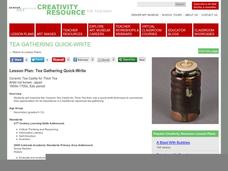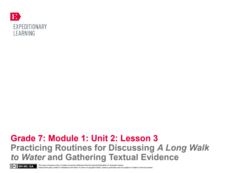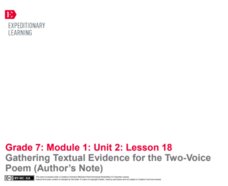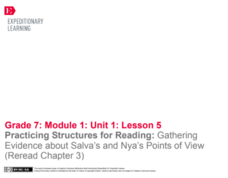Denver Art Museum
Tea Gathering Quick-Write
Japanese tea gatherings are the inspiration for a great activity. Learners are provided with an image of a tea caddy made for thick tea and asked to describe what they notice and what that might mean. This leads into a larger activity...
EngageNY
Further Research: Hunter-Gatherer Food Chain
It's time to gather nuts, berries, and lots of information. Scholars continue on their quest to determine the consequences of each of Michael Pollan's food chains from The Omnivore's Dilemma. Using research questions developed in a...
EngageNY
Determining Cascading Consequences Using The Omnivore’s Dilemma: Hunter-Gatherer Food Chain
Focusing on the consequences of the hunter-gatherer food chain that Michael Pollan discusses in The Omnivore's Dilemma, teams work together to create hunter-gatherer food chain consequences charts. Next, scholars view other groups'...
EngageNY
Practicing Routines for Discussing A Long Walk to Water and Gathering Textual Evidence
Welcome a new teacher (or two)! While most of the class works on the survival anchor chart, one pair begins the Salva/Nya chart and uses it to teach the class. Each day, scholars switch roles, giving every pair a chance to teach their...
Curated OER
People of the Stone Age: Hunters and Gatherers
Intended for a young audience, this presentation provides a simplistic view of the life of a Stone Age hunter/gatherer. Human migration, gathering, tools, and the Ice Age are covered but not in-depth. A topical discussion with good...
Overcoming Obstacles
Gathering Information
Before making important decisions, gathering as much information as possible is best. That's the take-away from the second lesson in the Decision-Making module of the Overcoming Obstacles course. Middle schoolers engage in a series of...
EngageNY
Resource Materials and Gathering Information: Reading Another “Choice” Text from the Research Folder
Look it up. Scholars use a dictionary and thesaurus to verify the meaning of the research vocabulary words they defined in the previous activity. They then use sticky notes to write a synonym for each word. Finally, individuals choose a...
Curated OER
Gathering Statistics for Research
Learners gather statistics to include in their research. In this statistics lesson, students investigate how to incorporate statistics into research and other readings besides math. They collect data based on other topics, analyze the...
Spark Notes
A Gathering of Old Men by Ernest J. Gaines: Study Guide - Mini Essays
In this online interactive literature instructional activity, students respond to 9 short answer and essay questions about Ernest Gaines's A Gathering of Old Men. Students may check some of their answers online.
EngageNY
Launching Researching: Reading for Gist and Gathering Evidence Using the Research Guide
Let's get to the gist! Pupils work in research teams to gather information about specific refugee experiences from Bosnia, Afghanistan, and Kurdistan. Scholars then try to find the gist of informational texts about their topics,...
EngageNY
Adding to Cascading Consequences and Stakeholders: Hunter-Gatherer Food Chain
Could the hunter-gatherer food chain feed everyone in the United States? To consider the question, pupils use their research and add to the Cascading Consequences chart based on Michael Pollan's hunter-gatherer food chain from The...
EngageNY
Establishing Structures for Reading: Gathering Evidence about Salva’s and Nya’s Points of View (Reread Chapters 1 and 2)
Readers practice gathering textual evidence to support their understanding of character point of view in A Long Walk to Water by Linda Sue Park. Working with partners, they complete a Gathering Evidence graphic organizer and engage in...
EngageNY
Gathering Textual Evidence for the Two-Voice Poem (Author’s Note)
Writers take a look at how to gather evidence from the information text in the unit that connects to Salva and Nya’s story. They complete a Gathering Evidence from Informational Texts sheet to guide their work. Pupils then use the...
EngageNY
Researching Miné Okubo: Gathering Textual Evidence
Scholars read two texts about Miné Okubo’s life. In Riverside’s Miné Okubo and Miné Okubo, readers gather information to write narrative essays describing how Okubo became visible again. The essay serves as part of a performance task.
EngageNY
Gathering Textual Evidence: “Invisibility” of Those Interned
Add another layer to the class's understanding. Scholars deepen their knowledge of the primary sources in their Japanese-American Internment during World War II packet and determine how the sources relate to the theme of invisibility....
EngageNY
Informational Essay Planning: Studying the Essay Prompt and Gathering Evidence
Using a Gathering Evidence note-catcher, readers record evidence in A Mighty Long Way and Little Rock Girl 1957. They then use the evidence to analyze and discuss different mediums with their peers. Lastly, they look at a writing prompt...
EngageNY
Practicing Structures for Reading: Gathering Evidence about Salva’s and Nya’s Points of View (Reread Chapter 3)
How does an author develop and contrast character points of view in a work of literature? Using a graphic organizer, readers continue gathering evidence about character point of view from Linda Sue Park's A Long Walk to Water. Next,...
EngageNY
Mid-Unit Assessment: Gathering and Using Evidence to Analyze Points of View in A Long Walk to Water (Chapter 5)
Class members discuss how culture, place, and time influence a character's identity in A Long Walk to Water by Linda Sue Park. Then, as part of a mid-unit assessment, they complete a Gathering Evidence graphic organizer to answer the...
American Battlefield Trust
The Gathering Storm: The Coming of the Civil War
Slavery or states' rights: What really started the American Civil War? A lesson geared towards middle schoolers explores the causes of the Civil War. Scholars view an interactive of the Gathering Storm exhibit online and complete a...
EngageNY
Researching Part 2: Reading for Gist and Gathering Evidence Using the Researcher’s Notebook
The gist should be short and sweet! Pupils practice finding the gist of an informational text and then write a summary of the text. Next, they gather with their research teams to discuss a focus question based on the novel Bud, Not Buddy...
Curated OER
Take Your Time
Your class examines the ways that they spend time by evaluating their own schedules. They create a peer research survey to gather information about their various habits. They analyze the data and compare/contrast the activities of...
Earth Day Network
The Neolithic Revolution
With the abundance of food products we can easily access in our society today, it is easy to forget the toll this can take on our global environment. Young learners will discover how the transition to agriculture and domesticated living...
Curated OER
Personal/Social Development
Many teenagers dream of growing up to work in health and safety fields; give them some real-world insight using this research lesson plan. Although there are just the basics here, you can easily use them as an outline for an engaging...
Curated OER
Hunters/Gatherers
Students discuss the ways in which an environment is used to provide the basic necessities of life. In groups, they compare and contrast how different hunter and gatherer groups have used the environment to their advantage. They place...
Other popular searches
- Hunters and Gatherers
- Hunter Gatherer Societies
- Early Hunters and Gatherers
- Hunter Gatherers to Farmers
- Hunter Gatherers
- Hunter Gatherers
- Hunter/gatherer Societies
- Paleolithic Hunter Gatherer
- Hunter and Gatherers
- Hunter Gatherer Simulation
- Hunter Gatherer Culture
- Hunter Gatherer Societies

























